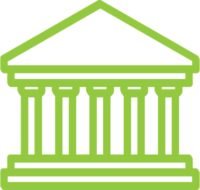Why is a bank account important?
One step towards independence and financial success includes having a bank account in your own name. Having a bank account opens a number of money management tools that banks and online vendors offer. Opening a bank account allows you to track your spending, access your money at ATMs and banks, save, sign up for direct deposit and much more. Keeping your money in the bank is safe and allows you to access it in amounts you need at the time.
How to open a bank account

Opening a bank account is a great step to take as you enter adulthood, and the process is simple. The first step is to shop around and see what the banks can offer. Banks have different minimum balances, fee structures, student accounts, online banking and more. If you are a student, you may want to open a student-friendly account with low or no fees. Also consider where you live and work in comparison to where your bank has branches and ATMs.
To open a bank account, you will need to take one or two pieces of ID and your Social Security number into the branch. Call or look at the bank’s website to check what ID you need.
There are generally two types of accounts: checking and savings. A checking account will give you quick access to your money, and you’ll be given a debit card to make ATM withdrawals and store purchases. A savings account is designed to help you save your money with incentives, such as earning interest.
Direct deposit
Direct deposit is one way your employer can pay you. Direct deposit allows your employer to electronically transfer your pay right into your bank account. Many employers are moving away from checks and only offering electronic methods of pay. The benefit of direct deposit to you is that you don’t have to wait for checks, deposit a check into your bank account or pay to have your check cashed at a check cashing facility. To sign up for direct deposit, register for the Participant Site at
https://participant.nycdoeopsr.org/
, select the “Direct Deposit” tab and follow the instructions on the direct deposit screens. Direct deposit is reliable, safe, and convenient!
Debit card
A debit card is a plastic card associated with a checking account, provided by your bank to allow you to access the funds in your checking account. The debit card is linked to your bank account and allows you to withdraw funds out of your account at many ATMs. In most cases your debit card will include a VISA or MasterCard logo. This means you can use your debit card to make store and online purchases up to the balance in your account. Using a debit card is a safe and easy alternative to using cash.
If your debit card gets lost or stolen, it’s easy to replace by contacting your bank. If your debit card is lost or stolen your money will be protected and insured by your bank.
Some debit card transactions may cost a fee. It is important to read the instructions that come with your card in order to avoid any unwanted fees.
ATM (Automated Teller Machine)
An ATM allows you to withdraw cash and make basic transactions without going into your bank. At an ATM machine, you can withdraw money, check your account balance, and transfer money between accounts. Your bank should have a large number of ATMs placed at convenient locations within your geographic area. Your bank should not charge you any fees to use their ATMs. Other banks and stores have ATM machines. Your debit card should work at these ATMs, however, you want to try to operate within your banks ATM network in order to avoid fees. Using an ATM at other banks and stores will in most cases cause you to incur fees. To avoid these fees plan your money needs and know your bank’s ATM locations. Most banks offer mobile apps that can help you locate an ATM.
Fees
Many banks offer bank accounts that do not charge fees. If you’re a student, you will probably qualify for free banking. It is important to shop for a bank that offers fee free accounts so your balance is not reduced by a monthly bank fee or activity fees.